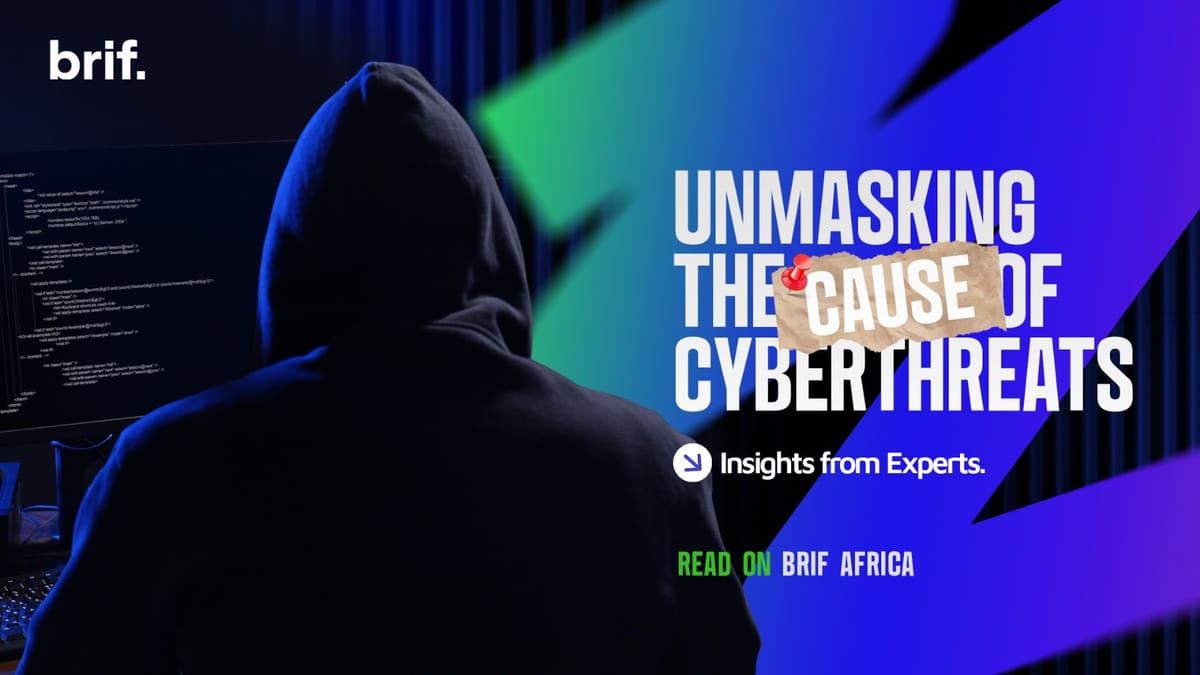Unmasking Cyber Threats in Africa: Insights from Experts.
I believe if there’s going to be a World War 3, its going to be a cyber war.” ~ Chinaza Obidike

As dawn breaks over the vast African landscape, a silent battle is underway, a battle against cyber threats that have become more common and advanced. In an era where digital transformation is accelerating, the question looms large:
How prepared are we to face the challenges posed by cybercriminals?
To explore this pressing issue, I sat down with two esteemed cybersecurity experts, Dr. Bright Mawudor and Chinaza Obidike, who shed light on the current landscape, emerging threats, and actionable strategies for resilience.
The Growing Cyber Threat Landscape
In recent years, Africa has experienced a surge in internet connectivity. Millions are coming online for the first time, eager to participate in the digital age. Mobile banking, e-commerce, and digital services have transformed daily life for many. In fact, Africa’s internet penetration has grown to around 43%, with countries like Nigeria and Kenya leading the charge in fintech innovation. Yet, as Africa connects, so do cybercriminals. As more financial services go digital, the continent is increasingly targeted by malicious actors. In 2020 alone, African economies lost approximately $4 billion to cybercrime, according to Interpol. The rapid digitization, while creating numerous opportunities, has made the region an attractive ground for hackers, particularly in countries with weak cybersecurity infrastructure.
Chinaza Obidike, an advocate for cybersecurity education and awareness initiatives, painted a vivid picture of the landscape. “Phishing attacks have become increasingly sophisticated, targeting both individuals and organizations,” she explained. “We need to recognize that cybercriminals are constantly evolving their tactics, and if we don’t keep up, we’re putting ourselves at risk.”
This is particularly concerning, as research shows that the African continent is experiencing a surge in cyber attacks, with a staggering 300% increase reported in some sectors over the past year alone.
Dr. Mawudor echoed these concerns, adding, “State-sponsored attacks are on the rise, with cybercriminals targeting critical infrastructure and sensitive information. The implications for our economies can be devastating.”
In a recent report by the African Union, it was revealed that cyber attacks could cost African economies up to $3.5 billion annually, a figure that underscores the urgent need for action. “We are facing a reality where our vulnerabilities could lead to significant economic losses if not addressed promptly,” he warned.
Challenges Unique to the African Context
The threats are diverse and evolving. In West Africa, phishing attacks where scammers trick users into revealing sensitive information are rampant. Nigerian cybercriminal gangs have gained global notoriety for their sophisticated fraud operations, often targeting international organizations. But the attacks are no longer just aimed at foreign entities. Local businesses and governments are increasingly falling victim to cyberattacks.
Take South Africa, for example. In 2020, it suffered a wave of ransomware attacks, where hackers lock users out of their own systems until a ransom is paid. The country’s ports, transport systems, and banks were all hit in a short span, costing millions of dollars. Imagine your National Identification Number (NIN), Bank Verification Number (BVN), and Tax Identification number being sold by an unlicensed website for just ₦100. Yeah! This happened in March 2024 in Nigeria.
The challenges are not merely technical; they are deeply intertwined with social and economic factors.
Dr. Mawudor emphasized the importance of focusing on specific industries. “Healthcare and finance are particularly vulnerable. We have seen ransomware attacks targeting hospitals, crippling their operations and putting lives at risk.” He remarked, “It’s alarming how easily our critical sectors can be compromised.”
According to a survey conducted by the International Telecommunication Union, 70% of organizations in Africa reported being victims of a cyber attack in the past year, with ransomware being the most prevalent threat.
Chinaza highlighted, “As we embrace digitalization, we inadvertently expand the attack surface for cybercriminals.” She added, “Many African countries are racing to catch up with global technology trends, but this rapid advancement often outpaces the development of robust cybersecurity measures.”
Strategies for Mitigation
"With cyber attacks it's not about if you would be attacked, it's about when." - Chinaza Obidike.
So, how can individuals and organizations shield themselves from these escalating threats?
Chinaza firmly believes in the power of education. “Ongoing training is crucial. Employees must be equipped to recognize and respond to cyber threats effectively. It’s about building a security-first culture.”
This sentiment is echoed by the World Economic Forum, which notes that human error is a factor in 95% of cybersecurity breaches.
“Organizations must prioritize their critical assets and establish strategies for cyber resilience. This means not just protecting against attacks but also having robust recovery plans in place.” Yeah, that is Dr. Mawudor advocating for a multi-faceted approach. He emphasized, “It’s not just about defense; it’s about having a plan B when things go wrong.” And that is having backups.
Oh, talking of backups, Chinaza added, “We are still in the middle of trying to balance on whether to pay the ransom or not. Most times when you pay the ransom, they give you a decryption key, and it doesn’t work. So now we don’t preach paying the ransom or not; what we preach is having backups of all your operations.”
This underscores the importance of preparation, as organizations must be ready for the possibility of an attack without relying on potentially futile ransom payments.
The call for collaboration resonated strongly with both experts.
“If we are going to combat cybercriminals effectively, we must set aside our egos and work together,” Dr. Mawudor urged. “ Knowledge sharing is essential. Remember, there’s strength in unity.”
Chinaza added, “If we work in silos, we will fail." We need partnerships between governments, organizations, and educational institutions to build a strong cybersecurity framework. Sharing knowledge is the key to strengthening our defenses.
Dr. Mawudor, one of the 'self-proclaimed' biggest cyber resilience advocates in the African continent," believes awareness should be ongoing always, and not limited only to Cybersecurity Awareness Month. “We need to get people on basic things like phishing attacks for personnel and strategy building when it comes to corporations,” he stressed, “someone sending a malicious link and you click on it—boom, you've been hacked.”
Chinaza echoed this, pointing out that even the best technical defenses can be undermined if employees and individuals don’t recognize the tactics cybercriminals use. “People are still unaware of how much damage they could prevent by just being cautious with emails or suspicious links,” she noted, stressing that a single click can open the door to devastating ransomware attacks or data breaches. In a continent where data security is increasingly a foundation for economic stability, they both argue that everyone—from top executives to daily users—must be vigilant.
Awareness campaigns are essential not only within companies but across the general population. According to Dr. Mawudor, these campaigns are crucial for building what he calls cyber resilience, the ability of an organization or individual to bounce back from an attack. This requires constant updating of knowledge about evolving threats and encouraging a "see-something, say-something" culture around cybersecurity risks.
The Future of Cybersecurity in Africa
Looking ahead, the experts shared their predictions.
"We must be proactive in our approach.” Dr. Mawudor stated, “We must stay vigilant and adapt our strategies continuously. Cybersecurity awareness cannot be a one-time event; it’s an ongoing process.”
“Emerging technologies like artificial intelligence will shape the future of cybersecurity,” Chinaza added. “While AI can enhance our defenses, it can also be weaponized by cybercriminals.
Chinaza also emphasized the importance of local expertise, stating, “We have the talent right here in Africa. It’s about nurturing our homegrown skills and encouraging innovation. We can develop solutions that address our unique challenges.”
Conclusion
As we navigate this complex landscape, one thing is certain. Cybersecurity is not just an IT issue; it’s a societal challenge that requires a collective effort. From individuals to organizations and governments, everyone has a very big big role to play in building a safer digital future.
Let us heed the call from Dr. Mawudor and Chinaza Obidike to foster a culture of collaboration and continuous learning. “Together, we can build a resilient cybersecurity framework that not only protects us but also empowers us,” Dr. Mawudor concluded.
Only then can we hope to outsmart cybercriminals and secure the digital landscape for generations to come.
Thanks for reading!
See you next time 😊.
Join our community HERE!





